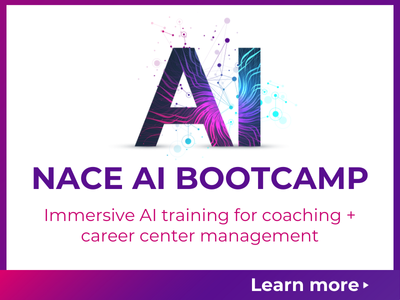Spotlight for Career Services Professionals
Alternative experiential learning opportunities—contests, hackathons, idea-thons, company “discovery” programs, and the like—may not fall into a school’s internship bucket but many can offer a learning experience. How does your career center handle these alternative experiences? NACE Community members offered their ideas:
- We added two buckets to our job form in Symplicity: ‘Experiential Learning Opportunities’ [ELO] and ‘Professional Development Opportunities’ [PDO]. We would post things like a hackathon, with hands-on learning, under the ELO Category and Contests, with Company Discovery Programs, etc. under PDO. We encourage students to include participation in these opportunities on their resume as well. We promote them and share them with students through our [career center newsletter.]
Tracey Lord, program director, experiential learning, Florida State University
- A few years ago, we started a case study competition to engage humanities and social sciences students in interdisciplinary problem solving. In its embryonic stages, the competition did not fulfill any program requirement—students simply opted into the competition. However, we will soon be converting the experience into a one-credit class which will count for a new experiential learning requirement that spans all majors in the college. I am happy to share more information with you about the competition and its timeline, our recruitment, assessment of outcomes, etc. if you email me at flemings@rowan.edu.
Stephen Fleming, assistant dean, Rowan University – Career Advisory Board
- Many of these can provide great opportunities for students, especially [students who are] looking to gain experience. My only concern with some of the ‘contest’ platforms is that they essentially require students to work for free without getting many of the benefits that usually come with case competitions and other experiential learning opportunities. Specifically, if a student is being asked to do work and only the winner will be compensated (financially and/or with actual engagement from a mentor), is this fair to the student? In addition, many students are unable to afford to work for free, one of the reasons that unpaid internships have hindered equitable access to professional pathways for students. All that said, for students or recent grads who have ample excess time and don't need the income, any of these are certainly better than nothing. However, I would strongly suggest that you work with your employer partners to create paid experiential learning opportunities that both support the students and add value for the employers (such as what Colby's Lisa Noble described in a recent NACE webinar).
Jeffrey Moss, founder and CEO, Parker Dewey
- Certainly, more work can always be done to develop more opportunities with existing partners; however, I am just trying to navigate what to do with the opportunities that are already posted to our students. I don't want to deny them the opportunity in the event that they are the one with the winning idea, but I also agree that it doesn't bode well to promote too many unpaid opportunities that we wouldn't approve it if were categorized as an internship. Do any other institutions have input on these typically unpaid experiential learning opportunities?
Audrey Fancher, internship and engagement coordinator, University of Portland
- I was just asked to launch an office of experiential learning, [which will work] in partnership with the career center. We're trying to make sure meaningful experiential learning, including projects, case competitions, and simulations, are built into every major and degree program at the college. I agree that if there isn't academic credit tied to the programs, you have to make sure that the experience itself is meaningful and interview-question-worthy, even if a team doesn't win. In the course I teach, I run about 40 to 50 student project teams with companies and about 120 student project teams doing case competitions each semester, so we've gotten good at scaling the program. Although the virtual world has been tricky for us to fully adapt. I'd be happy to chat.
Jamie Belinne, assistant dean, Career and Industry Engagement, University of Houston – C.T. Bauer College of Business
- I think that a fair question to these employers is who owns the work product submitted by the non-winners? If the students are going to invest their time and not be paid in any way, it seems to me that, at a minimum, the employers should be explicitly agreeing in writing not to use their work product in any way. Better yet would be a statement making it clear that the students own their own work product because, if the employer doesn't want it, then they also shouldn't stand in the way of the students making use of their own work.
Steven Rothberg, president and founder, College Recruiter
Where do hackathons and contests fit into your experiential learning? Join the discussion with ideas and suggestions in the NACE Community.






